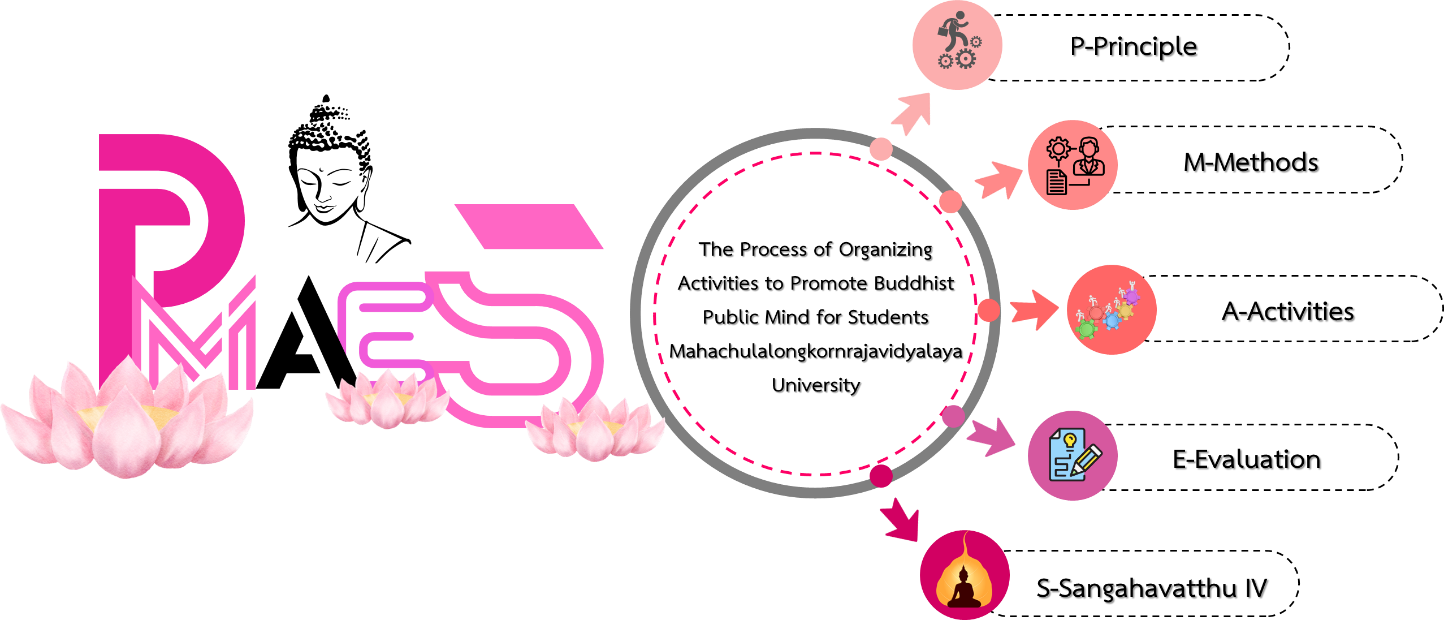THE PROCESS OF ORGANIZING BUDDHIST-BASED PUBLIC MIND PROMOTION ACTIVITIES FOR STUDENTS MAHACHULALONGKORNRAJAVIDYALAYA UNIVERSITY
Keywords:
Activity Organizing Process, Promotion, Buddhist Public Mind, MCU StudentsAbstract
Background and Objectives: The objectives of this research are to study the Buddhist public mindset among students at Mahachulalongkornrajavidyalaya University, to analyze the process of organizing activities that promote the Buddhist public mind for students at Mahachulalongkornrajavidyalaya University, and to present the process of organizing activities that promote the Buddhist public mind for students at Mahachulalongkornrajavidyalaya University.
Methodology: The research employed a mixed-methods approach for the quantitative study. The sample consisted of 375 students from Mahachulalongkornrajavidyalaya University, determined using Krejcie and Morgan's table. The statistics used included percentage, means, and standard deviation. For the qualitative research, in-depth interviews were conducted with 20 experts, focus group discussions were held with 10 participants, and 15 specialists evaluated the process.
Main Results: The results were found that: 1) The Buddhist-oriented public spirit of the students was divided into two categories and seven aspects, with an overall high level as follows: 1.1) Public spirit promotion had three aspects, ranked from highest to lowest; taking responsibility for maintaining public property ( = 4.05), respecting the right to use public property collectively (
= 4.04), and avoiding actions that may cause damage to public property (
= 3.97); and
1.2) The public spirit based on the Four Sangahavatthu principles had four aspects, ranked from highest to lowest: kind speech ( = 4.17), equality (
= 4.14), giving (
= 4.01), and helpfulness (
= 3.96); 2) The analysis of the process for organizing Buddhist-oriented public spirit promotion activities among students was divided into five aspects: 2.1) Principles of public spirit promotion; 2.2) Methods of public spirit promotion; 2.3) Public spirit promotion activities; 2.4) Evaluation of public spirit promotion activities; and 2.5) The integration of the Four Sangahavatthu principles with public spirit promotion; and 3) The presentation of the process for organizing Buddhist-oriented public spirit promotion activities according to the PDCA "Deming Cycle" (Plan-Do-Check-Act) to 15 experts showed that 12 experts (80.00%) believed the process was highly appropriate, 2 experts (13.33%) found it fairly appropriate, and 1 expert (6.67%) believed it was partially appropriate. Overall, the experts confirmed that the process was appropriate, beneficial, and could be effectively implemented as a model for organizing Buddhist-oriented public spirit promotion activities for students at Mahachulalongkornrajavidyalaya University.
Involvement to Buddhadhamma: This research article has applied Dhamma principles specifically, focusing on the Sangahavatthu IV principles. These principles are based on Dhamma, which serves as a foundation for mutual support and acts as a unifying tool. They embody the principle of winning people's hearts and promoting social welfare, fostering an environment where individuals live together with love and goodwill. The concepts include Dana (Generosity), Piyavaca (Pleasant Speech), Atthacariya (Beneficial Conduct), and Samanattata (Equality).
Conclusions: In organizing to promote a Buddhist public mind among students at Mahachula-longkornrajavidyalaya University, a structured process should be implemented. This process should include principles, methods, activities, and evaluations. Additionally, applying the four principles of social welfare can serve as a model or guideline for organizing activities that enhance the public mind. This approach will enable students to develop themselves, contribute to their society, and support the continued prosperity of the University.
References
Ajpru, H. (2001). The Relationship Between Personal Factors, Leadership, Lifestyle, and Self-Learning Ability with Public Consciousness of Nursing Students in Bangkok. [Unpublished master's thesis]. Chulalongkorn University. Bangkok, Thailand.
Department of Education Bangkok Metropolitan Administration. (2012). White School Project (Anti-Corruption): Growing Up without Corruption Curriculum, Mathayom 3. Bangkok, Thailand: Department of Education Bangkok Metropolitan Administration.
Mahachulalongkornrajavidyalaya University. (2015). History and Development of Mahachulalongkornrajavidyalaya University. (1st ed.). Bangkok, Thailand: 21 Century Company Limited.
Maneechoti, B. (1987). A Study of the Format of Questions to Measure Self-Sacrifice Personality Traits: Text Type and Situation Type that Affect the Quality of the Test. [Unpublished master's thesis]. Srinakharinwirot University. Bangkok, Thailand.
Office of Registrar and Evaluation, MCU. (2023). Statistics of Students of Mahachulalongkornrajavidyalaya University, Academic Year 2022. Phra Nakhon Si Ayutthaya, Thailand: Office of Registration and Evaluation, MCU.
Phrakru Niwetsilakorn, Theunchang, W. & Tossakrai, T. (2020). Guidelines for Strengthening Public Consciousness for Secondary School Students in Nakhon Sawan Province. Graduate Studies Review Nakhon Sawan Sangha College, 8(2), 55-66.
Phramaha Chatuporn Sutanon. (2009). Development of Public Consciousness of Students Regarding the Preservation of Religious Properties at Sripariyakhunsuksa School, Prathai District, Nakhon Ratchasima Province. [Unpublished master's independent study]. Mahasarakham University. Maha Sarakham, Thailand.
Saeng-Arun, K. (2008). Guidelines for the Development of Thai Youth Public Consciousness: A Case Study of Groups and Networks of Youth for Public Consciousness. [Master's thesis, Chulalongkorn University]. Chulalongkorn University Intellectual Repository. http://cuir.car.chula.ac.th/handle/123456789/56612.
Sinlacharu, T. (2020). Research and Statistical Analysis with SPSS and AMOS. (18th ed.). Nonthaburi, Thailand: S. R. Printing Massproducts Company Limited.
Sriplang, P. (2016). Development of Activities to Promote Public Consciousness for Education Students. [Doctoral dissertation, Burapha University]. DSpace Repository. https://buuir.buu.ac.th/xmlui/handle/1234567890/11539.
Thongyim, S. (2007). Participation in Community Development of the Village Committee Nong Pradu Subdistrict, Lao Khwan District, Kanchanaburi Province. [Unpublished master's thesis]. Suan Sunandha Rajabhat University. Bangkok, Thailand.
Warunpitikul, Y. (1999). Civic Consciousness: An Essay on Citizens on the Community Path. Bangkok, Thailand: Civic Net Foundation.

Downloads
Published
How to Cite
Issue
Section
License
Copyright (c) 2024 Journal of Buddhist Anthropology

This work is licensed under a Creative Commons Attribution-NonCommercial-NoDerivatives 4.0 International License.








